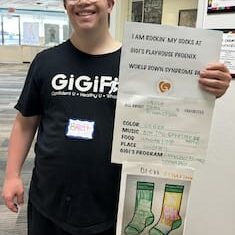No Surprises – Preparing for the Graduation Cliff
What’s Happening: Students with disabilities (SWDs) can take extra time to prepare for the transition to college and career, and in Arizona, they can stay in high school until age 22. Yet too often families are surprised senior year to find out their child will graduate that spring—whether or not they are ready for the transition.
What Needs to Change: SWDs and their families must begin to prepare for the impending graduation cliff (the transition from K-12 education) in their freshman year, if not sooner. Arizona is currently missing essential policies and resources to ensure SWDs can successfully navigate their transition to post-school life, but the state can take the following five steps to change that.
5 Recommendations for Arizona Policymakers
1. Establish a transition policy for students with disabilities.
Federal law requires SWDs to be provided with an Individual Education Program (IEP), which, by age 16, must plan for transitioning the student from high school to post-school life. These plans must include goals for employment, postsecondary education, or training as well as the services and support the student will require to achieve these goals. Most states have supplemented federal requirements with state policy. Arizona has not.
Next Steps: Federal law is a mere floor, and we have learned a lot since the federal transition policy was enacted in 2004. Arizona can establish a policy that mirrors best practices.
- Transition planning should begin at age 14 or freshman year. (This would align with the Education and Career Action Plans established in State Board rule that are also required to begin freshman year.)
- Policymakers should empower and enable parents to partner with schools in planning their child’s high school careers. In Florida, for example, parents have the opportunity to defer their child’s diploma.
2. Extend the graduation rate in state accountability.
The four-year graduation rate plays a significant role in Arizona’s accountability systems for high schools, but state law should not penalize schools for building individual graduation pathways and plans that support a successful transition to college or career for SWDs–even if they take longer than four years. Federal and state law backs this, and Arizona’s accountability system should as well.
Next Step: Eliminate any possible perverse incentives within Arizona’s accountability systems that may tempt schools to push SWDs into premature graduations. This means allowing schools to receive equal credit for extended-year graduations.
3. Implement a statewide IEP along with a graduation planning tool.
Currently, each district procures its own IEP. While the programs all meet federal requirements, they look and feel different. (For example, district IEPs don’t even have the same page numbers.)
A statewide IEP could benefit everyone involved.
- Schools & State Department: A state IEP could facilitate monitoring, auditing, and training while improving IEP sharing and transfers among schools.
- Advocates: Valuable data collection and a single, easier-to-navigate statewide IEP system would empower attorneys and stakeholders to help families and advocate for students.
- Educators & Families: Forms generated from the statewide IEP–such as graduation planning tools and other custom reports–would benefit teachers and parents.
Next Step: Arizona should create a state advisory council to guide the development of a state IEP. This state initiative shouldn’t cost districts and should ease their burden.
4. Coordinate benefits and resources.
Planning for life after high school is different for SWDs and their parents. Some families call this transition “the cliff.”
- Before graduation, students receive protections, benefits, and entitlements guaranteed by federal and state laws.
- After graduation, services and accommodations are no longer guaranteed or protected, supports are uncoordinated and difficult to navigate, and eligibility criteria are different.
Students need to leave high school with strong transition plans and equipped to advocate for themselves, but this rarely happens. Programs and services for K-12 students with intellectual and developmental disabilities are disjointed, confusing, and inconsistent, according to a recent report from the Arizona Developmental Disabilities Planning Council (ADDPC).
Next Step: The state agencies administering these key programs must collaborate to develop the resources families and students need to illuminate their post-school path. ADDPC’s report recommends the following steps:
- Appoint an ad hoc committee.
- Revise and clarify guidelines, time frames, and expectations for all partners.
- Identify the roles and responsibilities of students, families, schools, Vocational Rehabilitation, the Division of Developmental Disabilities, and vendors beginning in middle school through school exit.
- Review existing intergovernmental agreements.
5. Follow up with complementary guidance.
Even under the current policies, IEP teams face confusion regarding how, when, and where they can provide transition services to students with significant developmental delays such as autism and intellectual disabilities.
Next Step: The Arizona Department of Education should update existing guidance to clarify the flexibility IEP teams have to design and provide the services SWDs need to successfully transition to college or career.
Guest Blog Submitted By:
Karla Phillips-Krivickas
Recent Posts



